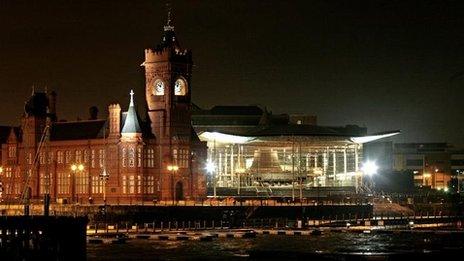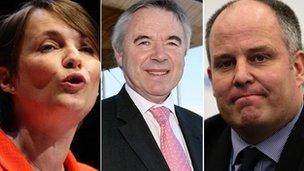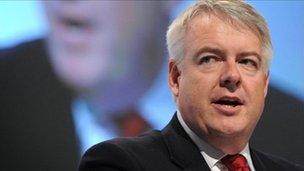Deadline looms for Welsh government seeking budget deal
- Published

Behind closed doors, AMs are trying to hammer out a budget deal
Politicians around the world are struggling to decide how to spend taxpayers' money during an economic crisis.
In Washington, a bipartisan committee has failed to bridge the political divide and agree on spending cuts.
The problem facing AMs in Cardiff Bay is a lot smaller.
Wales must cope with an estimated £2.1bn cut in its block grant over the next four years.
But as is in Congress, there is deadlock in the Senedd.
Without a majority, Labour needs the approval of at least one opposition member to pass its spending plans.
Crucial vote
Talks have been continuing behind closed doors, but as a deadline draws near, the Welsh government and its opponents show no sign they are close to an agreement.
The crucial vote on next year's budget takes place on 6 December.
In reality, ministers have less than five days to get their opponents on side.
A motion for the final budget must be laid next Tuesday - coincidentally, the same day that the Chancellor delivers his autumn statement.

Opposition leaders Kirsty Williams, Ieuan Wyn Jones and Andrew RT Davies united against the budget
The opposition put up a united front when AMs discussed the first draft of Labour's budget last week.
The Conservatives, Plaid Cymru and the Liberal Democrats lined up behind a joint amendment. But it did little more than restate each party's individual wish list.
The Tories want more for the NHS, Plaid want an enhanced economic stimulus package and the Lib Dems are urging ministers to move on education spending.
Labour's meetings with the Conservatives have gone no further than what Tory opposition leader Andrew RT Davies called "courtesy" talks.
The real negotiations are with Plaid and the Lib Dems.
'Urgency'
A Plaid source says they are "nowhere near a deal". Talks are polite, but lack "bite or urgency".
The Lib Dems say the pot of money the government has set aside to accommodate opposition spending priorities may not be big enough. A party source said "the coffee is on and can be smelt on the fifth floor" - where First Minister Carwyn Jones has his office overlooking the Bay.
For its part, the government says discussions are "progressing and ongoing". And it denies a charge by Plaid that the only money on the table is a £39m windfall from the Treasury. That's money which must be spent this year, but the first minister says an announcement about its destination is conditional on a deal over the budget.
With no deal in place, could it be that Labour will lay its £14.5b budget - without changes - and dare the opposition to back it or throw it out?
The consequences of a failure to agree a budget would be less dramatic than in the US, where no agreement means automatic spending cuts of $1.2tn, half of which will fall on defence.

Carwyn Jones will not want to be remembered for failing to agree a budget
In theory, if Labour loses the vote on 6 December, ministers could keep returning to the Senedd in search of a budget deal until the end of the financial year.
If the situation is still unresolved, an emergency provision kicks in whereby the budget for this year is effectively rolled over into next, but with a 5% cut.
The political consequences would be dire. Who in the Senedd would take the blame for heaping yet more cuts on already hard-pressed public services?
After falling one seat short of the majority it craved at May's election, Labour decided to press on alone.
Mr Jones reached out to the opposition, promising to act "without tribalism".
Given the mission he has set himself, he will not want to be remembered as the first minister who failed to agree a budget for the first time in devolution's history.
- Published11 November 2011
- Published10 November 2011
- Published4 October 2011